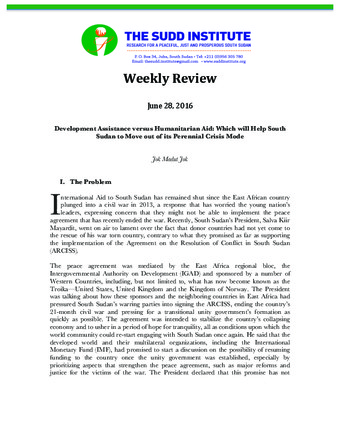Development Assistance versus Humanitarian Aid: Which will Help South Sudan to Move out of its Perennial Crisis Mode
Publication Summary
Seven weeks since the Transitional government of National Unity was formed, however, international development assistance to South Sudan remains shut. The countries that sponsored South Sudan’s peace process have suggested that they have not really cut aid to South Sudan, but have simply channeled it toward humanitarian programs and away from direct government budget support and from contribution to funding public projects. This suspension was effected soon after the war broke out as a form of punishment to the government for escalating the war, a punishment many South Sudanese hoped would end as soon as the peace agreement was implemented. Many steps have been taken by South Sudanese over the last two months toward this implementation. These efforts are still lacking in major ways, but the promised resumption of aid was not to be. The donor world seems to remain outraged about the inclusion of certain personalities in the unity government, people who had previously been accused of presiding over the near demise of the country, and yet were reinstated. With them sitting at the helm of power, the world community seems to signal that there will be no bailout, out of fear that such assistance would go the same way it did before the war, into the pockets of these same individuals. The current Minister of Finance and Economic Planning, David Deng Athorbei, has particularly been seen by many in the international community as someone whose role is considered counterproductive to the economic well-being of the distressed nation. His reinstatement, therefore, surfaces as disregard to the concerns of those who want to help South Sudan embark on more productive reforms.
In short, the donors have pegged the resumption of aid to a number of specific demands that they believe the leaders of South Sudan must meet in order to build confidence in the government’s capacity to address head-on the crises facing the country. These demands include, among many, the establishment of the so-called Transitional Government of National Unity, followed by major institutional reforms, instituting fiscal and monetary policies that would re-stabilize the national economy, particularly through reduction in public expenditure and to stop the wastage of national resources through mismanagement and diversion. The donors have also suggested that direct financial assistance to government can only happen again through a negotiated process that would involve the International Monetary Fund (IMF) and complete with conditions that could be quite painful in the short term but necessary for long term recovery.
Jok Madut Jok is trained in the anthropology of health and holds a Ph.D. from the University of California, Los Angeles (UCLA). He is a fellow of Rift Valley Institute and Director of the Sudd Institute. Jok has held fellowship positions at a number of other institutions, including the United States Institute of Peace and the Woodrow Wilson International Center for Scholars. He also served in the Government of South Sudan as undersecretary in the Ministry of Culture and Heritage for three years. He has also worked in aid and development and author of four books and numerous articles covering gender, sexuality and reproductive health, humanitarian aid, ethnography of political violence, gender-based violence, war and slavery, and the politics of identity in South Sudan and Sudan. His book Breaking Sudan: The Search for Peace, was published in 2017 by OneWorld.
Download Full Report (1019 KB)

